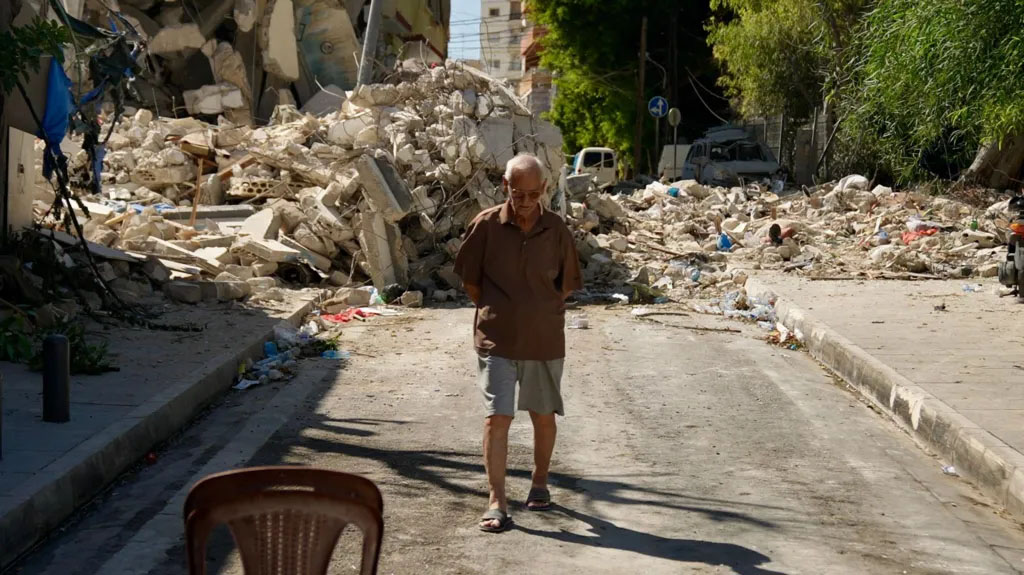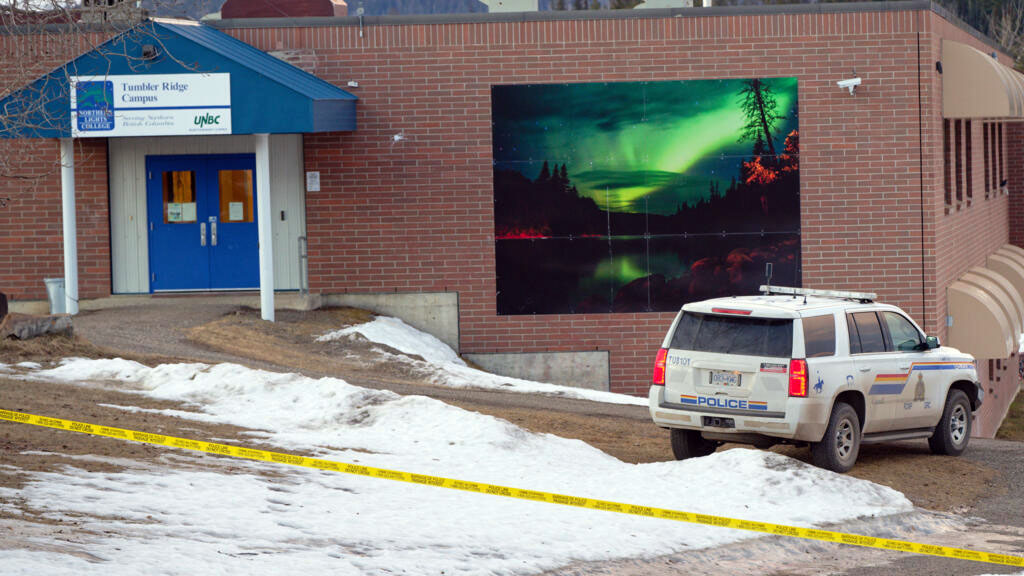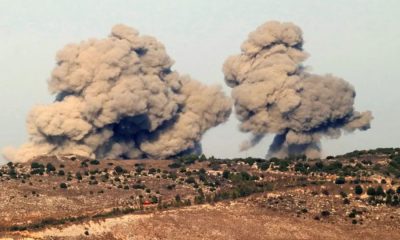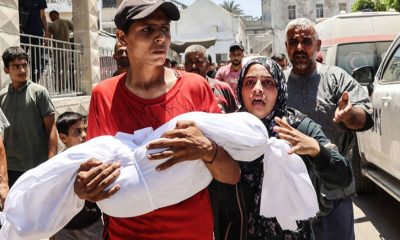International
Anger, grief in south Lebanon city, almost deserted after Israeli strikes

Anger, grief in south Lebanon city, almost deserted after Israeli strikes
Conversations in Tyre in southern Lebanon happen in a hurry now. It’s not wise to linger on the streets, and there are fewer and fewer people to talk to.
Chats can be cut short by the rumble of Israeli bombing, or the sound of outgoing rocket fire by Hezbollah – which can attract incoming fire.
Israeli drones buzz overhead.
You drive fast, but don’t speed, knowing there are eyes in the sky. Mostly you are the only car on an empty road – which can make you a target.
That knowledge is always with us, like the body armour we now wear.
But civilians here have no armour plating to shield them, and many Lebanese no longer have a roof over their heads. More than one million have been forced to flee, according to the Prime Minister, Najib Mikati.
War has created a vacuum here – sucking the life out of this ancient city proud of its Roman ruins, and golden sandy beach.
Streets are empty, and shops shuttered. The seashore is deserted. Windows rattle with Israeli air strikes.
The local civil defence headquarters lies abandoned – rescue teams were forced to evacuate – to save themselves after they got a telephone warning from Israel.
Israeli strikes are getting louder and closer to our hotel – in recent days several strikes on the hills opposite us appear to involve some of Israel’s most destructive bombs, weighing in at 1000lb.
And then there is the Hezbollah factor. Even as the armed group is trying to hold off invading Israeli troops on Lebanese soil, it is controlling the international media in the city of Tyre. It limits our movements, though it has no control over what we write or broadcast.
READ ALSO:
- Netanyahu: Macron’s call for arms embargo ‘a disgrace’
- Terrorists storm Geidam (Yobe), kill resident, destroy properties
- Lagos man stabs pregnant wife to death over alleged affair with younger brother
In hospitals, doctors look weary and overwhelmed. Many no longer go home because it is too dangerous to travel.
Instead, they tend to patients like nine-year-old Mariam, whose left leg is in a cast, and whose arm is heavily bandaged. She lies sleeping in a bed in Hiram Hospital, dark hair framing her face.
“She came in as part of a family of nine,” said Dr Salman Aidibi, the hospital CEO.
“Five of them were also treated. We operated on Mariam, and she is doing much better. We hope to send her home today. Most casualties are given first aid here and stabilised before being sent to other centres, because this hospital is on the front line.”
He says the hospital receives about 30-35 injured women and children a day, and it is taking its toll on staff.
“We need to be positive while we’re working,” he said. “It’s when we stop and contemplate, remember, that’s when we get emotional.”
Asked about what may lie ahead his response comes with a sigh. “We are in a war,” he says. “A destructive war on Lebanon. We hope for peace, but we are prepared for all eventualities.”
Also prepared for the worst is Hassan Manna. He’s staying put in Tyre as war tightens its grip. And he is staying open for business at the small coffee shop he has run for the past 14 years. Locals still pass by for a chat and some reassurance in the form of small plastic cups of sweet coffee.
“I’m not leaving my country,” Hassan told me. “I’m not leaving my house. I’m staying in my place, with my children. I’m not afraid of them (the Israelis).
“The whole world is out on the streets. We don’t want to be humiliated like that.
“Let me die in my house.”
Five of his neighbours were killed in their home by an Israeli air strike last weekend. Hassan saw it happen and was thrown in the air by two incoming Israeli missiles.
He managed to walk away with just an injured arm.
Was there a Hezbollah target there? We don’t know. Hassan says the dead were all civilians and members of one family, including two women and a baby.
Israel says its targets are Hezbollah fighters and their facilities, and not the people of Lebanon. Many here say otherwise – including doctors, and witnesses like Hassan.
Israel says it is taking steps to minimise the risk of harming civilians – accusing Hezbollah of hiding its infrastructure among civilian populations.
READ ALSO:
- 23 states, FCT implement new teachers retirement age
- Rivers crisis: “Wike is nobody, Nigeria won’t surrender to him” — Asari Dokubo
- Floods, landslides leave 16 dead in Bosnia
“There was nothing (no weapons) there,” Hassan insisted. “If there was, we would have left the area. There was nothing to be bombed. The woman was 75.”
After the strike he dug in the rubble for survivors until he collapsed and was taken to hospital himself.
When he speaks of his neighbours his voice breaks with anger and grief – and his eyes fill with tears.
“It’s unjust,” he said, “totally unjust. We know the people. They were born here. I swear I wish I had died with them.”
Ten days ago, we got the view in a Christian area, close to the border.
One local woman – who asked not to be named – told me everyone was living on their nerves.
“The phone is constantly beeping,” she said. “We can never know when (Israeli) attacks are coming. It’s always tense. Many nights we can’t sleep.”
We were interrupted by the sound of an Israeli air strike, which sent smoke rising from distant hills.
She reeled off a list of villages nearer the border – now deserted and destroyed after the past year of tit for tat exchanges between Hezbollah and Israel.
She said the damage in these areas was already far greater than in the five-week war of 2006. “If people want to come back later”, she said, “there are no houses left to come back to.
“And there is no house that did not lose relatives,” she said, “either close or distant. All the men are Hezbollah.”
Before the war the armed group was always “bragging about its weapons, and saying it would fight Israel forever,” she told me. “Privately, even their followers are now shocked at the quality and quantity of attacks by Israel.”
Few here would dare to guess at the future. “We have entered a tunnel,” she said, “and until now we cannot see the light.”
From Tel Aviv, to Tehran, to Washington no one can be sure what is coming next, and what the Middle East will look like the day after.
Anger, grief in south Lebanon city, almost deserted after Israeli strikes
BBC
International
Trump Halts Minnesota Immigration Crackdown After Fatal Shootings, Protests

Trump Halts Minnesota Immigration Crackdown After Fatal Shootings, Protests
The Trump administration has officially halted Operation Metro Surge, a controversial immigration enforcement operation in Minnesota, following widespread protests, political backlash, and the deaths of two U.S. citizens. The decision was announced by Tom Homan, the U.S. “border czar,” who confirmed that President Donald Trump approved ending the monthslong crackdown.
Operation Metro Surge, launched in December 2025, focused on the Minneapolis–St. Paul metropolitan area, deploying nearly 3,000 federal immigration officers at its peak. The operation aimed to detain undocumented immigrants, which the Department of Homeland Security (DHS) described as targeting “criminal illegal aliens.” However, reports indicate that many detainees had no criminal records, including children and U.S. citizens, raising concerns about the operation’s scope and fairness.
- Army University Professor Dies in Boko Haram Captivity After Nearly One Year
- MURIC Calls Proposed US Sanctions on Nigerian Muslims ‘Lopsided’
- Supreme Court Affirms Muslim Students’ Right to Worship at Rivers State University
The crackdown drew intense public opposition after anti-ICE protesters Renée Good and Alex Pretti were fatally shot during separate incidents in Minneapolis. The shootings intensified calls for accountability and prompted local and national criticism of federal enforcement tactics.
In a statement, Homan said, “I have proposed and President Trump has concurred that this surge operation conclude.” He noted that a drawdown of federal personnel had already begun, with a smaller contingent remaining temporarily to transition operations and coordinate with local authorities.
During the operation, DHS reported over 4,000 arrests, though critics highlighted the disproportionate impact on communities and families, emphasizing the humanitarian and civil liberties concerns arising from the surge.
Minnesota officials, including Governor Tim Walz and Minneapolis Mayor Jacob Frey, welcomed the decision, calling the operation an overreach that harmed communities and strained trust between law enforcement and residents. Civil rights groups also praised the halt but urged comprehensive immigration reforms to prevent future abuses.
The end of Operation Metro Surge marks a significant development in the national debate over immigration enforcement, sanctuary policies, and federal authority, highlighting the challenge of balancing border security with human rights and community safety.
Trump Halts Minnesota Immigration Crackdown After Fatal Shootings, Protests
International
Russia Escalates Digital Control with Attempted WhatsApp Block

Russia Escalates Digital Control with Attempted WhatsApp Block
WhatsApp has accused the Russian government of trying to completely block its messaging service in the country, a move aimed at steering users toward the state-backed app MAX. The Meta-owned platform said the effort, reported on February 12, 2026, threatens over 100 million users and undermines private, encrypted communication in Russia.
In a statement, WhatsApp said: “Today the Russian government attempted to fully block WhatsApp in an effort to drive people to a state-owned surveillance app. Trying to isolate over 100 million users from private and secure communication … can only lead to less safety for people in Russia. We continue to do everything we can to keep users connected.”
READ ALSO:
- Tumbler Ridge Massacre: Canada Investigates Shooter’s Mental Health, Police History
- Ex-Acting AGF Nwabuoku Admits Diverting N868.4 Million to Private Firms
- Kwankwasiyya Urges US Congress to Drop Kwankwaso’s Name from Bill
The attempt is part of a broader crackdown on foreign tech platforms in Russia. Authorities have previously restricted access to Facebook, Instagram, and targeted other services like Telegram. Reports indicate that Roskomnadzor, Russia’s communications regulator, removed WhatsApp from its national internet directory, forcing users to rely on VPNs to access the platform. Critics warn that such measures are designed to expand state surveillance and control over digital communication.
The government is actively promoting MAX, a domestic “super-app” similar to China’s WeChat, which combines messaging with other services. Rights advocates caution that the push toward MAX could compromise privacy protections that platforms like WhatsApp provide. Meanwhile, Kremlin officials have indicated that WhatsApp and other restricted apps could be restored if Meta complies with local data storage and regulatory laws.
WhatsApp’s statement emphasizes that the company will continue to work to keep its service accessible where possible, but the attempted block highlights Russia’s ongoing effort to enforce digital sovereignty and shift users toward state-controlled technology platforms.
Russia Escalates Digital Control with Attempted WhatsApp Block
International
Tumbler Ridge Massacre: Canada Investigates Shooter’s Mental Health, Police History

Tumbler Ridge Massacre: Canada Investigates Shooter’s Mental Health, Police History
Canadian authorities are intensifying investigations into the mental health history and prior police interactions of Jesse Van Rootselaar, the 18-year-old who carried out a deadly mass shooting in the remote mining town of Tumbler Ridge, British Columbia, on February 10, 2026. The tragedy has left the small community in mourning and raised national questions about gun control, mental health support, and law enforcement interventions.
According to RCMP Deputy Commissioner Dwayne McDonald, authorities are still unclear on the motive behind the attack, which is one of the deadliest school shootings in Canadian history. Van Rootselaar, a transgender woman who had dropped out of Tumbler Ridge Secondary School four years ago, first killed her mother and stepbrother before opening fire at the school, where she shot six more victims. The shooter later took her own life at the scene.
Investigators have confirmed that Van Rootselaar was known to police and had previous interactions with the public health system due to mental health concerns. Authorities are reviewing prior incidents, including earlier firearms seizures and her lapsed gun licence, to understand how warning signs were addressed before the massacre. British Columbia Premier David Eby said officials are working with the health system to determine “what interactions may have taken place” in the past.
READ ALSO:
- Ex-Acting AGF Nwabuoku Admits Diverting N868.4 Million to Private Firms
- Kwankwasiyya Urges US Congress to Drop Kwankwaso’s Name from Bill
- Liverpool Edge Sunderland 1-0 to Halt Impressive Home Streak
The victims include a 39-year-old female teacher and five students aged 12 and 13, with one child, 12-year-old Maya Gebala, in critical condition after trying to lock herself and classmates in a library during the attack. First responders arrived within minutes, but the scale of the violence left the tight-knit community of about 2,700 residents reeling. Hundreds gathered for a candlelight vigil to honour those killed and injured.
Prime Minister Mark Carney addressed parliament, describing Tumbler Ridge as a resilient, compassionate community of miners, teachers, and construction workers, and emphasised the need to learn from the tragedy. Flags across Canada have been lowered to half-staff for seven days in remembrance of the victims. Britain’s King Charles and Queen Camilla also expressed shock and sorrow over the massacre.
Schools in the area will remain closed for the remainder of the week as authorities continue their investigation into Van Rootselaar’s mental health background, police interactions, and access to firearms, seeking to understand how similar tragedies can be prevented in the future.
Tumbler Ridge Massacre: Canada Investigates Shooter’s Mental Health, Police History
-

 metro3 days ago
metro3 days agoIKEDC Sets Feb 20 Deadline for Customers to Submit Valid IDs or Face Disconnection
-

 Education3 days ago
Education3 days agoSupreme Court Affirms Muslim Students’ Right to Worship at Rivers State University
-

 News2 days ago
News2 days agoAso Rock Goes Solar as Tinubu Orders National Grid Disconnection
-

 metro2 days ago
metro2 days agoLagos Police Launch Manhunt for Suspect in Brutal Ajah Murder
-

 Business3 days ago
Business3 days agoNaira Could Trade Below ₦1,000/$ With Dangote Refinery at Full Capacity — Otedola
-

 International3 days ago
International3 days agoTrump Halts Minnesota Immigration Crackdown After Fatal Shootings, Protests
-

 metro3 days ago
metro3 days agoArmy University Professor Dies in Boko Haram Captivity After Nearly One Year
-

 Sports2 days ago
Sports2 days agoLookman Shines as Atlético Madrid Hammer Barcelona 4-0















